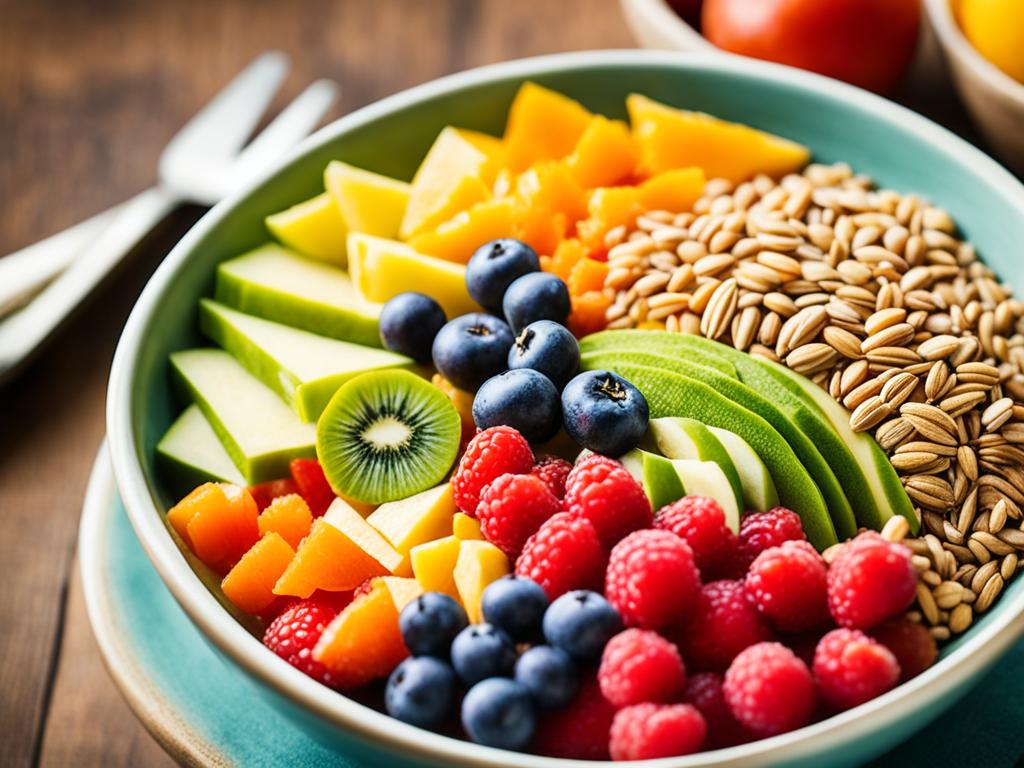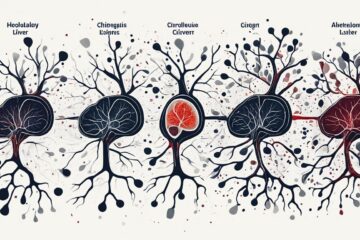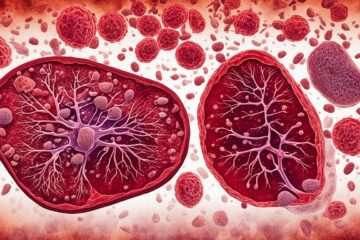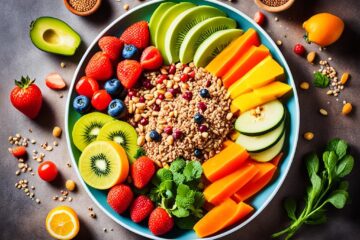I think of our bodies as amazing systems. They thrive when we feed them well. Fiber is a key nutrient that stands out to me. This hero helps us from our digestive system to managing our weight. It even fights off illnesses.
We’re going to dive into the benefits of dietary fiber. It’s a must for a balanced, healthy diet. Learning about fiber will show you how to keep your intestines healthy. Then, you can choose foods that benefit your long-term health.
Key Takeaways
- Fiber is a vital nutrient that plays a crucial role in overall health and well-being.
- Fiber supports optimal digestive function, weight management, and the prevention of chronic diseases.
- Understanding the importance of fiber can help you make informed dietary choices for long-term health and wellness.
- Fiber-rich foods are recommended by nutritionists as part of a balanced and healthy diet.
- Incorporating more fiber into your daily routine can have a transformative impact on your overall well-being.
Understanding the Importance of Fiber
Fiber is key to a healthy diet. It’s a complex carbohydrate the body can’t fully digest. But, it’s vital for good gut health, digestion, and nutrient absorption. If you want to be healthier, fiber is a must.
What is Fiber and Why is it Essential?
There are two main types of fiber, found in fruits, vegetables, whole grains, legumes, and nuts. Soluble fiber dissolves in water, helping control blood sugar and cholesterol. Insoluble fiber doesn’t dissolve, but it makes stool bulkier. This helps with regular bowel movements.
Fiber keeps the digestive system healthy. It regulates bowel function, prevents constipation, and decreases the risk of gut problems. Plus, it’s important for nutrient absorption. Slowing down digestion lets the body use nutrients better.
The Different Types of Dietary Fiber
There’s also prebiotic fiber. It feeds the good gut bacteria, which boosts microbiome health and digestion. Chicory root, garlic, onions, and whole grains are examples of prebiotic fibers.
Knowing about fiber types and their benefits helps. It guides you to add more fiber to your diet. A mix of fiber-rich foods ensures you get enough. This supports your health all around.
Le pouvoir des fibres: Pourquoi elles sont essentielles pour votre bien-être
Les fibres alimentaires sont vitales pour rester en bonne santé globale. Elles offrent de nombreux bienfaits des fibres pour une vie meilleure et active.
Elles sont clés pour un système digestif en santé. Les fibres alimentaires aident à bien digérer. Elles évitent les soucis d’estomac et maintiennent un transit régulier. Ceci améliore l’assimilation des nutriments et vous rend bien chaque jour.
Ces fibres aident aussi à contrôler le poids. Remplies de bons nutriments, elles vous font vous sentir rassasié. Elles limitent aussi l’absorption de calories, soutenant votre poids idéal.
Enfin, elles jouent un rôle majeur dans la prévention de maladies graves. Elles baissent les risques de maladies cardiaques, de diabète de type 2 et de certains cancers. Cela favorise votre santé globale.
Augmenter votre apport en fibres alimentaires est un choix très bénéfique. Cela peut grandement améliorer votre bien-être et votre vie en général. Prendre soin de votre santé de cette manière est un vrai atout à long terme.
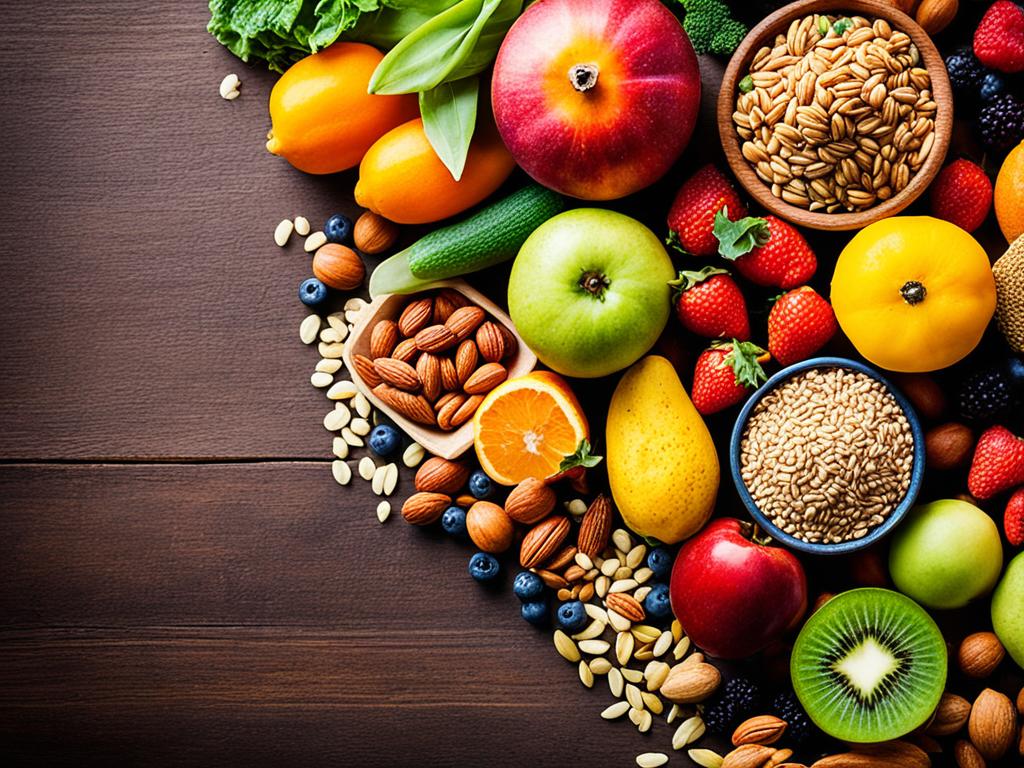
Fiber and Digestive Health
Keeping our digestive system in good shape is crucial for our health. Fiber is key for this. It aids digestion and helps prevent issues in our gut and with our bowel function.
How Fiber Aids in Optimal Digestion
Fiber is a complex carbohydrate that our body doesn’t fully digest. It goes through our system, bringing important digestion benefits. Soluble fiber helps food move smoothly in our intestines, keeping our bowel movements regular and preventing constipation. Insoluble fiber makes the stool bigger, which helps our gastrointestinal system function well and eases waste removal.
Preventing Constipation and Gastrointestinal Issues
It’s important to eat enough fiber to avoid constipation and other digestion troubles. Fiber adds bulk to the stool and keeps food moving through our system. This maintains our bowel movements, reducing the discomfort of constipation.
Fiber also lowers the chance of getting diverticulitis, hemorrhoids, and other gut health problems. It does this by keeping our bowel function healthy.
The Role of Fiber in Weight Management
Fiber is key in managing weight. By adding fiber and weight management to your diet, you control appetite and feel fuller longer. This helps cut down calorie intake, backing your weight loss and keeping you healthy.
One big plus of fiber is how it keeps you from getting too hungry. Foods high in fiber take a while to digest. So, you stay full longer, which stops you from snacking too much or eating more than you should. Fiber-rich foods help control your appetite and make you satisfied with less.
Fiber also helps with calorie absorption. Soluble fiber, for instance, slows how fast nutrients get into your blood. This regulates weight loss by avoiding sudden blood sugar spikes. Those spikes can cause cravings and overeating, making it harder to lose weight.
| Benefits of Fiber for Weight Management | Explanation |
|---|---|
| Appetite Control | Fiber-rich foods take longer to digest, leaving you feel full for longer. This helps cut down on snacking and overeating. |
| Satiety | Fiber’s satiety properties make you feel satisfied with less, reducing the urge to eat too much. |
| Calorie Absorption | Certain types of fiber, like soluble fiber, slow nutrient absorption. This helps avoid quick blood sugar spikes and regulates weight loss. |
Adding more fiber and weight management tips to your daily life is a great choice. It aids your health and wellness goals, especially if you’re looking to lose weight or stay healthy.
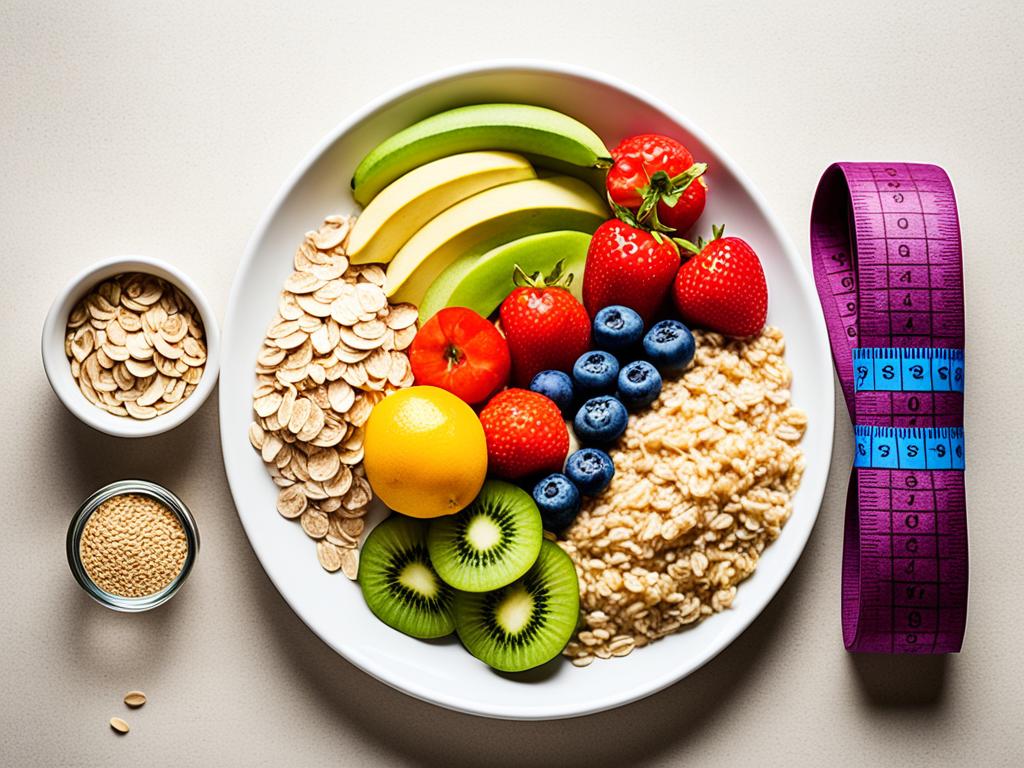
Fiber and Chronic Disease Prevention
Eating enough fiber can really help prevent many serious health issues. Studies show that a diet high in fiber lowers the chances of getting heart disease, type 2 diabetes, and some cancers.
The Link Between Fiber and Reduced Disease Risk
Fiber helps in many ways. It keeps blood sugar steady, dials down bad cholesterol, and supports good gut health. This makes it a powerhouse in fighting off chronic diseases. Soluble fiber, found in oats, beans, and berries, is especially good for the heart.
Fiber’s Impact on Heart Health
Adding fiber to your meals cuts your risk of heart problems. It works by keeping blood pressure, cholesterol, and inflammation in check. Studies say people who get enough fiber each day are less likely to have heart issues.
Fiber and Cancer Prevention
More fiber means less risk of some cancers, like colon cancer. It keeps your bowels moving and helps flush out toxins. Fiber also makes compounds that fight cancer and keep your gut healthy.
Incorporating More Fiber into Your Diet
Eating more high-fiber foods can truly transform your diet. You can do this by slowly changing how you eat. Include added dietary fiber sources in your meals every day. This way, you get the many benefits of fiber for your health without trouble.
High-Fiber Food Sources
To boost your fiber, mix high-fiber foods into your meals and snacks. Some top sources of dietary fiber are:
- Whole grains, such as oats, quinoa, and brown rice
- Legumes, including beans, lentils, and chickpeas
- Fruits, especially berries, apples, and pears
- Vegetables, such as broccoli, Brussels sprouts, and artichokes
- Nuts and seeds, including almonds, chia seeds, and flaxseeds
Tips for Increasing Fiber Intake Gradually
To make your fiber level go up easily, start slow. Here are easy steps:
- Add more high-fiber foods to your meals each day.
- Snack on fiber-rich options, like apple slices with almond butter or mixed nuts.
- Try new recipes high in fiber and swap out low-fiber choices.
- Drink more water as you boost your fiber intake.
Follow these steps mindfully and pick from various dietary fiber sources. This way, you create a diet rich in fiber. It helps with digestion, keeping your weight in check, and feeling well overall.
Recommended Fiber Intake Guidelines
Eating enough fiber is key for good health. The recommended fiber intake guidelines help us get enough. The American Dietetic Association sets these guidelines. They change based on age:
| Age Group | Recommended Fiber Intake (grams per day) |
|---|---|
| Children (1-3 years) | 19 grams |
| Children (4-8 years) | 25 grams |
| Males (9-13 years) | 31 grams |
| Females (9-13 years) | 26 grams |
| Males (14-18 years) | 38 grams |
| Females (14-18 years) | 26 grams |
| Adults (19 years and older) | Men: 38 grams, Women: 25 grams |
Following these guidelines offers many health benefits. It improves how we digest food, helps us manage weight, and lowers disease risks. Adding fiber-rich foods to your daily meals helps you reach the fiber goals. This supports your health and wellness.
Potential Side Effects and Precautions
While the upsides of more fiber are great, we need to watch out for side effects. Adding too much fiber too fast can lead to tummy troubles. This includes bloating, gas, and stomach pains.
Fiber and Hydration
To avoid these problems, drink enough water. Fiber soaks up water in our guts. If you’re not hydrated, you might get constipated. Drink lots of water every day, especially as you eat more fiber.
Gradually Increasing Fiber Intake
It’s smart to add fiber slowly to your diet. Not sudden big changes. Doing this lets your body get used to the extra fiber. This makes it less likely you’ll have stomach issues.
Start by eating a bit more fiber each day. Then, over a few weeks, add more. This way, your body has time to adjust.
Remember to take care when upping your fiber. Being careful can help you enjoy the good parts. This while avoiding the bad, like upset stomachs.

Dietary Fiber and a Balanced Lifestyle
Adding fiber to our health plan is key for feeling our best. A diet rich in fiber, along with regular exercise and good stress management, sets the path for long-term health.
Combining Fiber with Exercise and Stress Management
Fiber, exercise, and managing stress work together. Fiber helps our digestive system and keeps our weight in check. It’s also critical for helping our body handle stress and keep our immune system strong. When mixed with working out, fiber boosts heart health, muscle strength, and energy.
Moreover, adding fiber to your diet and ways to manage stress like meditation form a strong team. This teamwork helps keep us emotionally strong and our minds clear. Taking care of both body and mind needs boosts our overall well-being remarkably.
To live fully, combine fiber with exercise and manage stress well. Doing so paves the way to a healthy and vibrant life. It’s the best approach for reaching your health’s peak.
Conclusion
Fiber is key for staying healthy and feeling good. It helps with digestion, weight, and keeping diseases away. Knowing this, people can pick foods that are good for them.
There are many kinds of fiber, like soluble, insoluble, and prebiotic. They help our body digest food better, control hunger, and lower disease chances. Eating more fiber, as suggested, is a big boost for health.
A healthy life mixes a lot of fiber in meals, regular exercise, and managing stress. This mix is great for reaching health goals and staying lively. By focusing on fiber, we set ourselves up for a better future.
